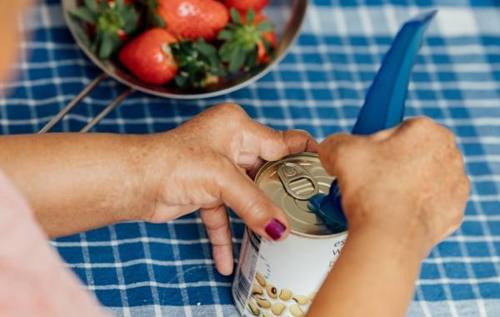Tips for going to university if you have arthritis or a musculoskeletal condition
06 September 2023
Going to university is an incredible milestone, but we know it can be a little daunting too, especially if you’re living with a long-term condition like arthritis.
There's no one better to give advice to than people who’ve been in your shoes, so we spoke to Georgia and Melissa.
Georgia, 21, lives with polyarticular juvenile idiopathic arthritis (JIA) and is now studying Pharmacy at university. Meanwhile, Melissa, 25, lives with lupus and studied Occupational Therapy at university.
Choosing your university
 Where should you go to university and what should you study? It’s a big decision to make but ultimately, it’s just about finding what works for you.
Where should you go to university and what should you study? It’s a big decision to make but ultimately, it’s just about finding what works for you.
Some people, like Georgia, find it helpful to study near to home. “I found it easier managing my condition being that bit closer to home,” she says.
“It was easier for me to keep up with hospital appointments and manage my studies, but that might not be the same for everyone.
“I had one bad flare-up in university this year and I came home for the weekend because I needed somebody to look after me. That's one of the perks. You can go home on a Friday, rest and come back on Sunday.”
“Some people will absolutely love moving away and don’t need to live close to home though,” she adds. “Maybe you’ve got a good support group of friends, or you register for the hospital elsewhere. It's about finding what works for you.”
If there aren’t suitable university courses nearby but you want to stay close to home, you could explore distance learning courses, for instance, courses at the Open University.
If you do decide to move away from home, Georgia says she would “100% recommend visiting your university in-person beforehand.”
You might want to ask yourself:
- How would you manage, both while you are well and if you became unwell?
- How spread out are the university buildings?
- How far away would you be living from your building?
- What's the journey like to your parents'/carers' home?
Applying for your university course
When you’re applying for university, it’s worth telling them about your condition on your UCAS applications.
This won’t be used to make a judgement on your application. It will simply help the university put the support you need in place. Remember most courses can be made accessible with a bit of support.
Georgia suggests that you take a closer look at the course modules too. “Ask yourself how hands-on is the course going to be? How many hours are in-person? Are you somebody who would rather be in all the time, or would you prefer to learn away from the classroom?”
If you don't get the grades you need, don’t panic. Speak to other universities and see if there are any options in clearing or you could always defer for a year. If you need to come home mid-year that’s okay too. You can always go back and try again when the time is right for you.
Read UCAS’ tips for applying to university with a physical health condition
Managing your arthritis
As you’ve grown up, you’ve probably taken on a little bit more responsibility for managing your arthritis. Maybe you already organise your doctor's appointments and repeat prescriptions.
If you’re not yet taking a leading role in your healthcare, preparing for university may be a good time to start.
The first step is to learn more about your condition and the treatments you’re on. Try to discover what triggers your flare-ups and how you can best look after yourself.
“Make sure you give yourself time to relax and sleep at university. Self-care is 10 times more important when you've got a chronic condition”
Deciding where your healthcare team will be
 If you’re thinking of going to university, Melissa says “it’s worth having those discussions with your healthcare team early.”
If you’re thinking of going to university, Melissa says “it’s worth having those discussions with your healthcare team early.”
That’s because if you’re moving away from home and typically see a rheumatologist, you might want to decide whether you want to stay with your existing team or transfer to a new team near university.
If you’re unsure what to do, talk the options through with your healthcare team, so you can make an informed choice.
Whatever you choose, it’s always worth at least registering with a GP at university. That way you can keep your prescriptions up-to-date and have a point of contact if needed.
“The medication you’re on is key and it needs a bit of preparation, so my advice would be to find a new GP as soon as possible,” Melissa adds. “Because it takes quite a bit of time to get your records from one GP to another and to prescribe the medicine.”
Set reminders and track your symptoms
Some people find it helpful to keep a diary where they record their symptoms, concerns or appointment times.
You could use pen and paper, your phone notes, or an app like our Arthritis Tracker. It’s about finding what works for you.
You could also set reminders or alarms to remind you to take and order more medication. “I don’t have my mum to remind me to take my injections, so I now set an alarm to remind me,” Georgia says.
Accommodation and living away from home

When you go to university, chances are you’ll live in student accommodation to start. “It might seem scary at first, but they’re very accommodating,” says Georgia. “For example, I have a fridge in my room because my injections need to be refrigerated.”
“If you need a fridge in your room or a bigger room because you use a mobility aid, don’t be afraid to let them know what you need. It’s completely fine.”
When it comes to chores, remember to pace yourself and give yourself a break if you’re dealing with fatigue or pain. It might also help to let your flat mates know if there’s any chores you find challenging.
For instance, if you find it hard to bend or squat when sweeping with a dustpan and brush, you might want to swap chores with someone else. Chat to an occupational therapist about any aids or adaptations if you think that might make living independently a bit easier for you too.
Some people might feel a little homesick when they go to university – and that’s okay. If you’re struggling to manage your condition or just need your home comforts, Melissa says not to be afraid to ask for help.
“Be honest and open to your loved ones,” she says. “You’re resilient but it’s okay to say ‘Mum, I'm coming home this weekend. I need to sleep in my own bed and I'm tired of my flat mates'. It's also okay to share with your healthcare team ‘Uni isn't going great, I need help’.”
Get support
 To help you reach your full potential, most universities will have teams in place to support you.
To help you reach your full potential, most universities will have teams in place to support you.
These are often called Student Support Services, Student Welfare Offices or Disability Support teams.
What’s offered will vary depending on where you go to university, but they should be able to support you with everything from finding the right accommodation, to taking your exams, and applying for Disabled Students’ Allowance (DSA).
“To anybody who you know has a chronic condition and thinks ‘maybe I can't do it’ you so can. There are procedures in place to make it as easy as possible for you,” says Georgia.
“Your university will be accommodating, so tell them what you need, and they should put everything in place. My university has been very good in terms of providing extra time and rest breaks for exams, for example.”
Disabled Students Allowance
If you have arthritis and are going to university, you may be entitled to financial and practical support through the Disabled Students Allowance (DSA). They may provide funding for items such as laptops or ergonomic chairs and equipment.
DSA has been “a massive help” to Georgia, providing an ergonomic chair to help her with her studies.
Talk to your tutors
Being open with your tutors and letting them know about your condition might help them understand your needs. This might be useful if you’re having a flare-up and need a deadline extension, for instance.
“One time, I was feeling unwell, and I had a couple of pieces of coursework due,” remembers Georgia.
“I told my mentor about it, and they said to me ‘you don’t need to stress yourself out over it. If you want, apply for extenuation circumstances and we can extend the deadline’.
“Don't be scared to put your hands up and say, 'I'm having a flare, I’m feeling poorly and I’m not feeling up to this.’ Sometimes you need a bit of time to make yourself better before tackling that bit of coursework”
Looking after your mental wellbeing
Let’s face it: when you're juggling several deadlines, university can be a little stressful at times. Over the years, Melissa says she’s learned that “stress is a key trigger” for her lupus. But the good news is she’s found small ways to cope with it.
“I do a gratitude journal in the morning where I’ll write down what I'm grateful for, how my day's gone so far, and I’ll reflect on it,” Melissa says. “It's important to write your worries down because sometimes they can build up.”
When it comes to coursework, it might also be worth getting organised and pacing yourself, rather than cramming. “When it comes to assignment deadlines, ask yourself: do you need to put a fatigue management schedule in place to manage those assignments?” Melissa suggests.
Physical activity
 Staying active can also be a good stress-buster – and Georgia couldn’t agree more.
Staying active can also be a good stress-buster – and Georgia couldn’t agree more.
“One way I relieve my stress is the gym,” she says. “It keeps my joints mobile, it’s improved my confidence, it boosts my happiness and serotonin levels.”
“You can’t work, work, work all the time. Allow yourself to have a bit of a break. You're only human. You’re a university student, but you’re also going through a chronic condition at the same time.
"So, be honest with yourself about the way you feel and have the confidence to tell other people about the way that you're feeling.”
Socialising
Whether you’re joining societies, going to parties or simply having a chill night in with your flatmates, socialising is a big part of university life.
If nights out are your bag, Georgia says enjoy yourself but try to pace yourself and not over-do it. “I love going out, but I would just suggest listening to your body,” she explains. “If I’ve been out a few times this week, it’s okay not to go out the fourth time you know?”
“It’s nice to forget about your condition. But sometimes you have to think, ‘Okay my wrist is hurting a bit, I should rest’ or ‘My ankles are hurting so I shouldn’t wear heels tonight, I’ll wear trainers instead.”
Choosing not to drink alcohol because of your condition and medication is a sensible decision. It might also be the safest thing to do. But if you’re going to drink alcohol, it’s best to know your limits and be sensible. Take it easy and listen to your body.
Throughout your university years, your friendship group will be there for each other through thick and thin. You might want to talk about your condition, so they can support you practically and emotionally.
“Be confident about it,” Georgia says. “It’s not a negative thing. If anything, it’s something to be proud of.”
The fact that you get up in the morning, go about your day-to-day life and you can do what you can do with this chronic condition, is a superpower. If anyone's got anything negative to say about it, it sounds like a ‘them’ problem to me!”
Commuting and travelling to classes
If you’re living off campus or your university campus is out of town, you might spend a bit of time travelling to and fro.
When choosing your university, Georgia recommends “doing your commute and seeing what it would be like”.
“If you’re commuting, ask yourself will you be able to do that if you’re having a flare-up? And if you can’t, will your university understand? The majority probably will.”
“This year, I’ve lived in student accommodation, which has been a three minute walk to my lectures every day. Next year, I'm about 20 minutes away but there is a bus stop close by and I can take my car if I need it. 95% of the time I’ll be fine, but it’s about putting those contingencies in place.”
If you need to carry books and equipment to your lectures, you might want to consider buying a bag with wheels. Some universities may also provide financial support for taxi journeys when you’re having a flare-up.
Try and stay positive
Heading to university might seem a little nerve-wracking. While challenges might come up, remind yourself that you’re capable of overcoming them.
“Be kind to yourself and remember you can still do things, but just may need a bit of adaptation and change in your life,” says Melissa.
Georgia also says to stay as positive as you can and to ask for help, when you need it.
“I’ve loved every second of university. I couldn’t recommend it enough,” she says. “I promise it’s not as scary as it looks. I think it's just about trying to stay as positive you can.
“Sometimes it’s hard when you’re having a flare-up and you want to sit in bed all day. If you need to do that, that’s fine. Just think ‘Okay I’m going to gather myself and tomorrow or next week will be my time. Look after yourself and have a positive mindset.”
We’re here to help
If you’re going to university and feeling a bit nervous, remember we’re here to help you every step of the way.
If you’re under the age of 25 and have arthritis, you can reach out to our Young People and Families Service.
We offer helpful information and support on how to manage your condition. Plus, we put on a range of events across the UK where you can meet other young people with arthritis.
You could also:
- Call our free helpline on 0800 5200 520
- Join our online community
- Stay in touch and follow us on Twitter, Facebook and Instagram.